Tuesday Triage #51
- TUESDAY TRIAGE #51 by Vadim Drobinin
- On inspiration
- Things I enjoyed reading
- 1. No More Movies by @jayriverlong
- 2. Stepping Back from Speaking by @martinfowler
- 3. Alcohol, health, and the ruthless logic of the Asian flush by @dynomight7
- 4. The Yoghurt Mafia by @EvaCorlett
- 5. Can America save its national dish? by @asymmetricinfo
- 6. How To Get Better at Painting – Without Painting Anything by Paul
- 7. Eraser men by Jean-Baptiste Mouttet
- 8. JaNee: Where Is She Now? by @aarongoldfarb
- 9. Kaspersky Password Manager: All your passwords are belong to us by Jean-Baptiste Bédrune
- 10. What did ancient languages sound like? by Nicholas Swift
- Things I didn't know last Tuesday
- 1. Burning of Library of Alexandria
- 2. Tarantula Hawk
- 3. Bubble and squeak
- 4. Langar
- 5. The Kern baby
- 6. Quentin Zastoupil
- 7. Jun
- 8. Statue of the Virgin Mary in Riga
- 9. Bombay Time
- 10. Cotter
- Book of the week
- Thank you and see you in a week!
TUESDAY TRIAGE #51
by Vadim Drobinin ¶
Your weekly crème de la crème of the Internet is here!
06.07.2021 (read in browser)
On inspiration ¶
Last week we went out to a local pub with friends, and while usually pub food is rather predictable, I had a few unexpected encounters at this particular place.
Here are black pudding croquettes with apple sauce. Really smart filling, and a very British combination too (at least to me, the foreigner).
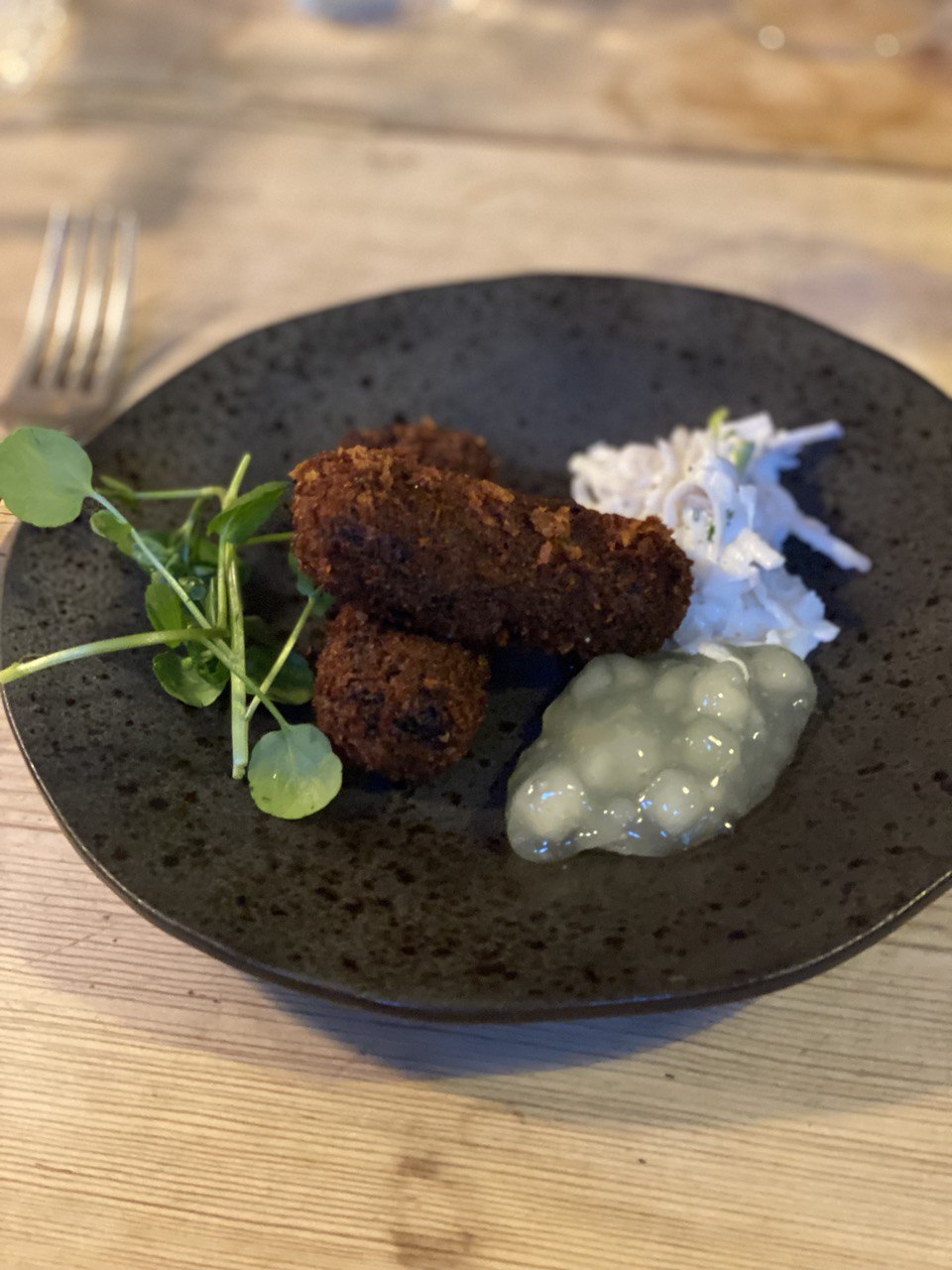
And here is a chicken, ham hock & leek pie. I am a huge fan of all things pies, and while this one was rather decent, I realised that out of many things I can stand, a couple of broccoli paired with a pie is not one of them. Please don't do that. Broccoli doesn't belong to the same plate as pie and mashed potatoes.
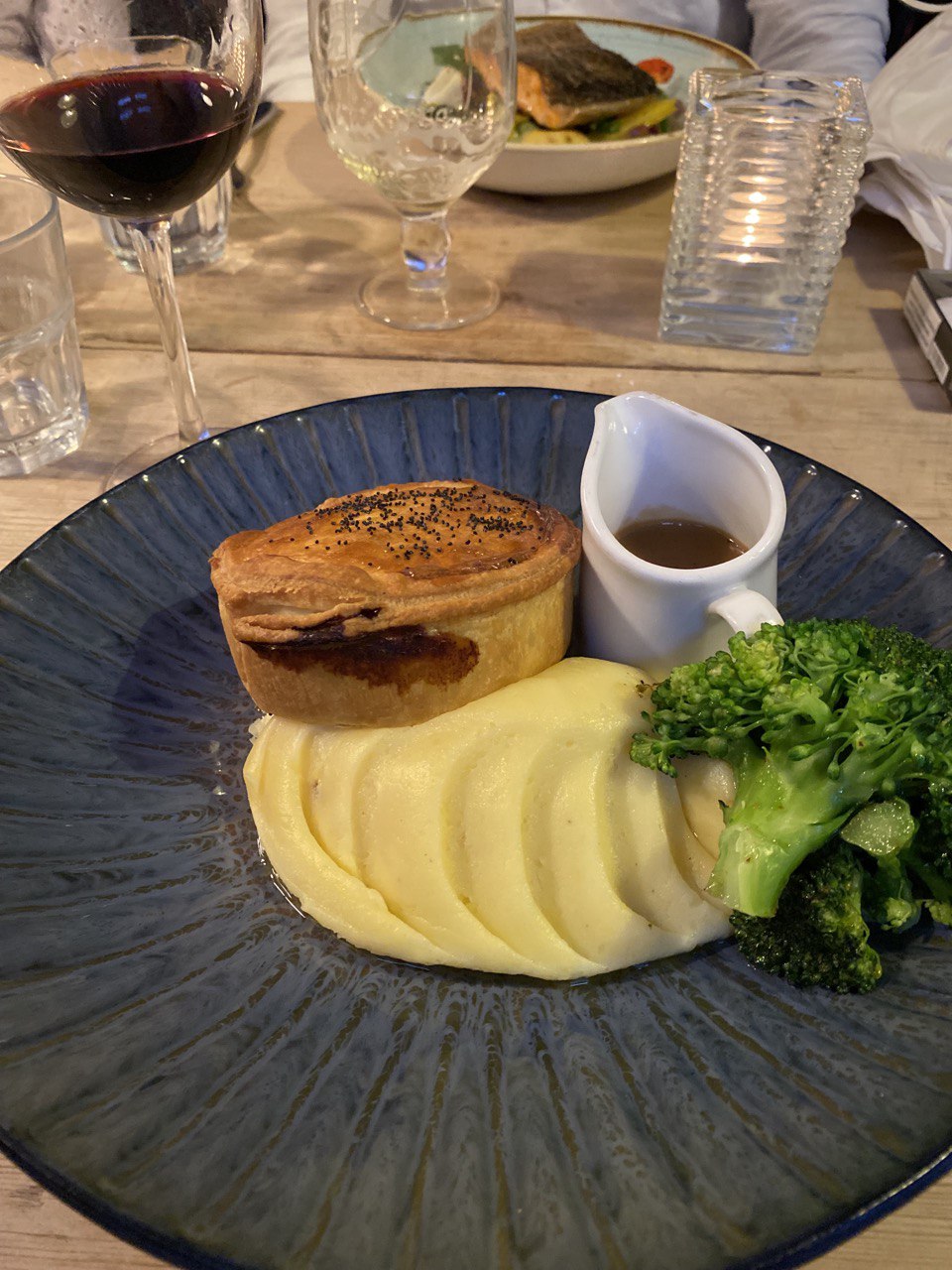
I also tried to make one of the Italian delicacies, an Easter cake called pastiera napoletana. It calls for some obscure ingredients, namely cooked wheat berries (grano cotto). Ricotta and honey made out of Sicilian lemon flowers were way easier to find.
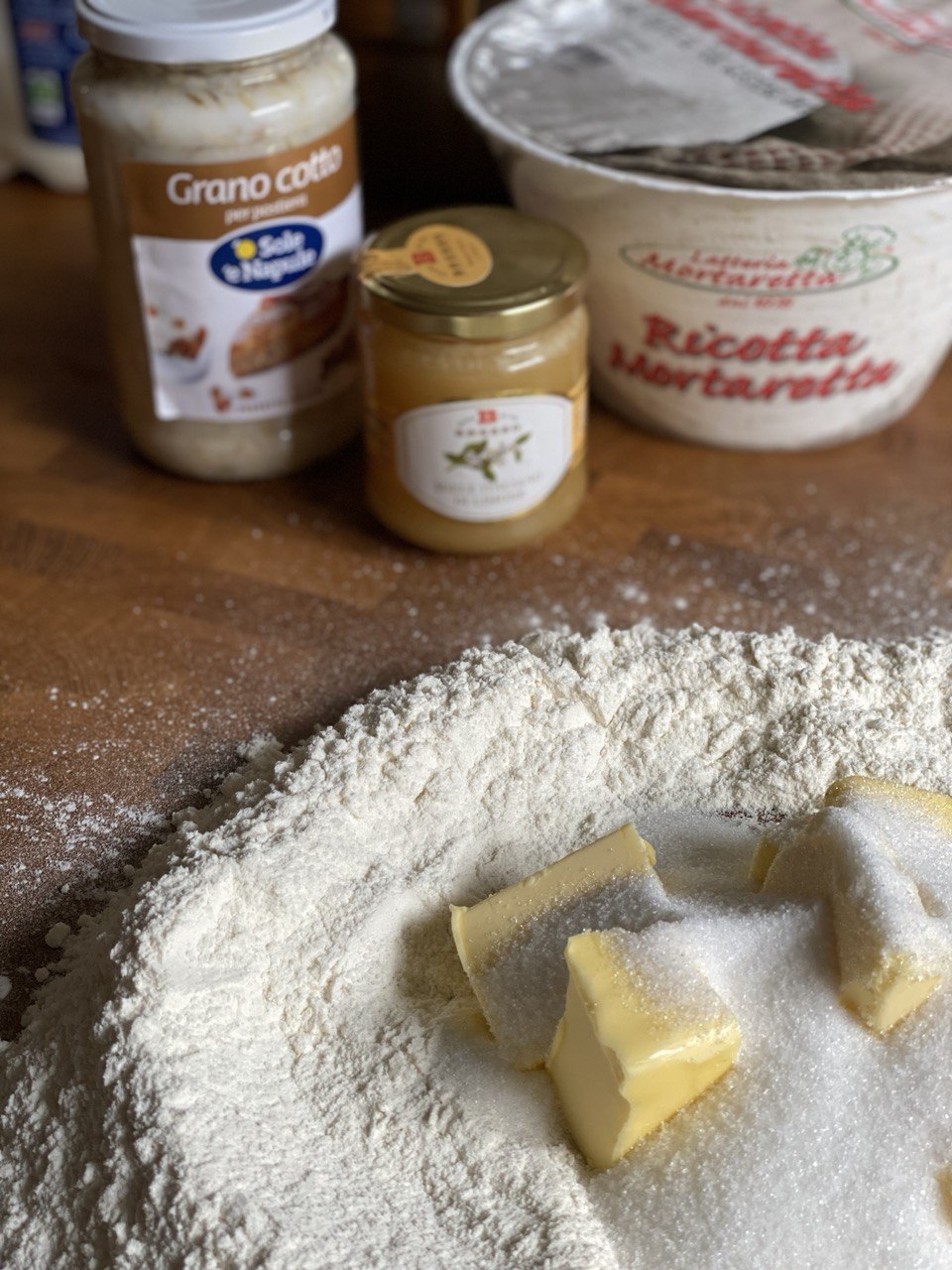
Also the dough was quite fun to make. It is essentially a shortbread dough, but with some eggs, orange zest, and honey mixed in.
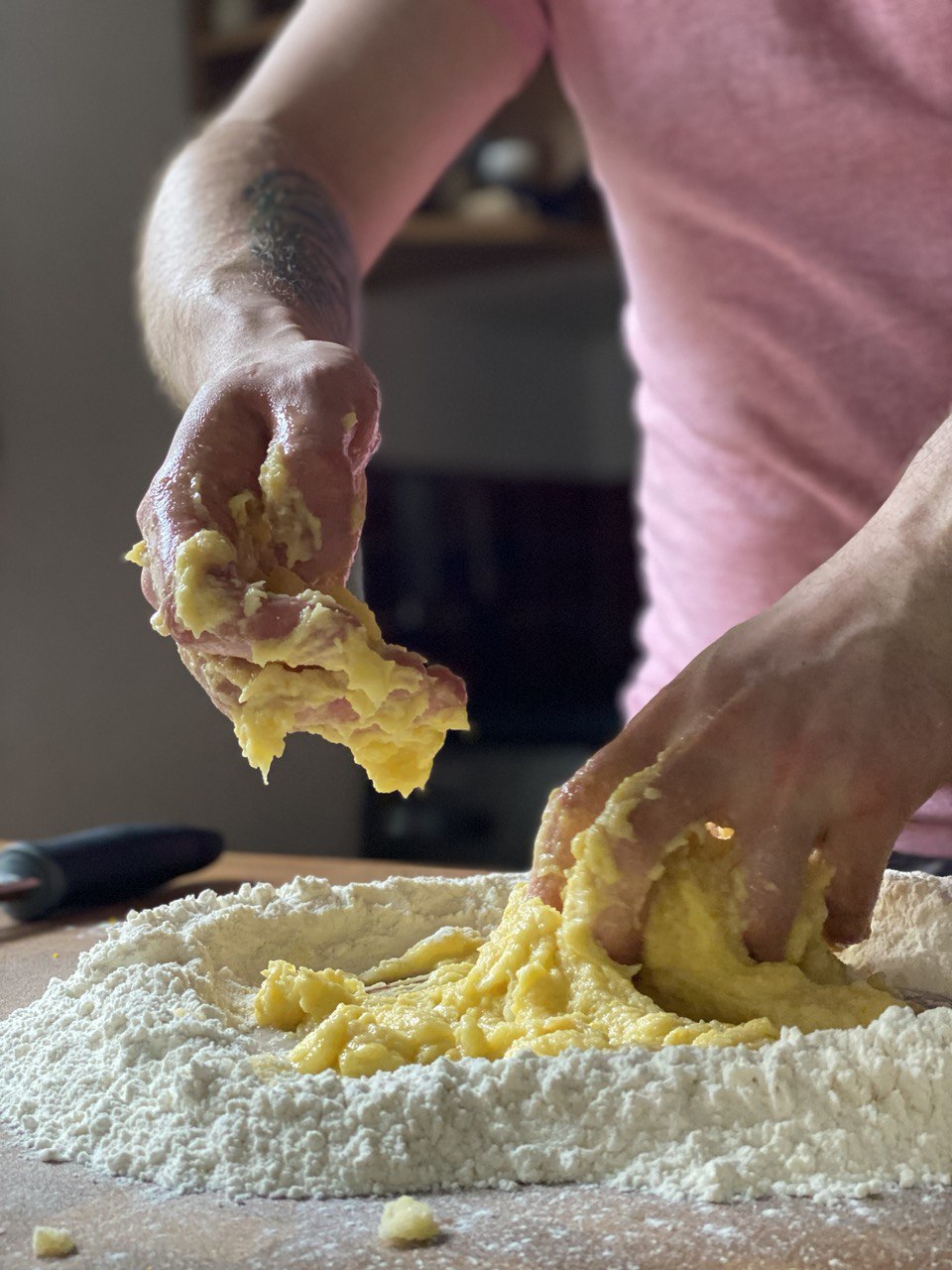
I didn't find candied citrus around, so had to make some from scratch. And boil the already cooked wheat berries with milk and more zest.

To make things even harder, the only form I had was twice higher than the ones folks usually use for pastiera, so I had to double the amounts, and bring all my skills to the table to make sure it doesn't leak while in the oven.
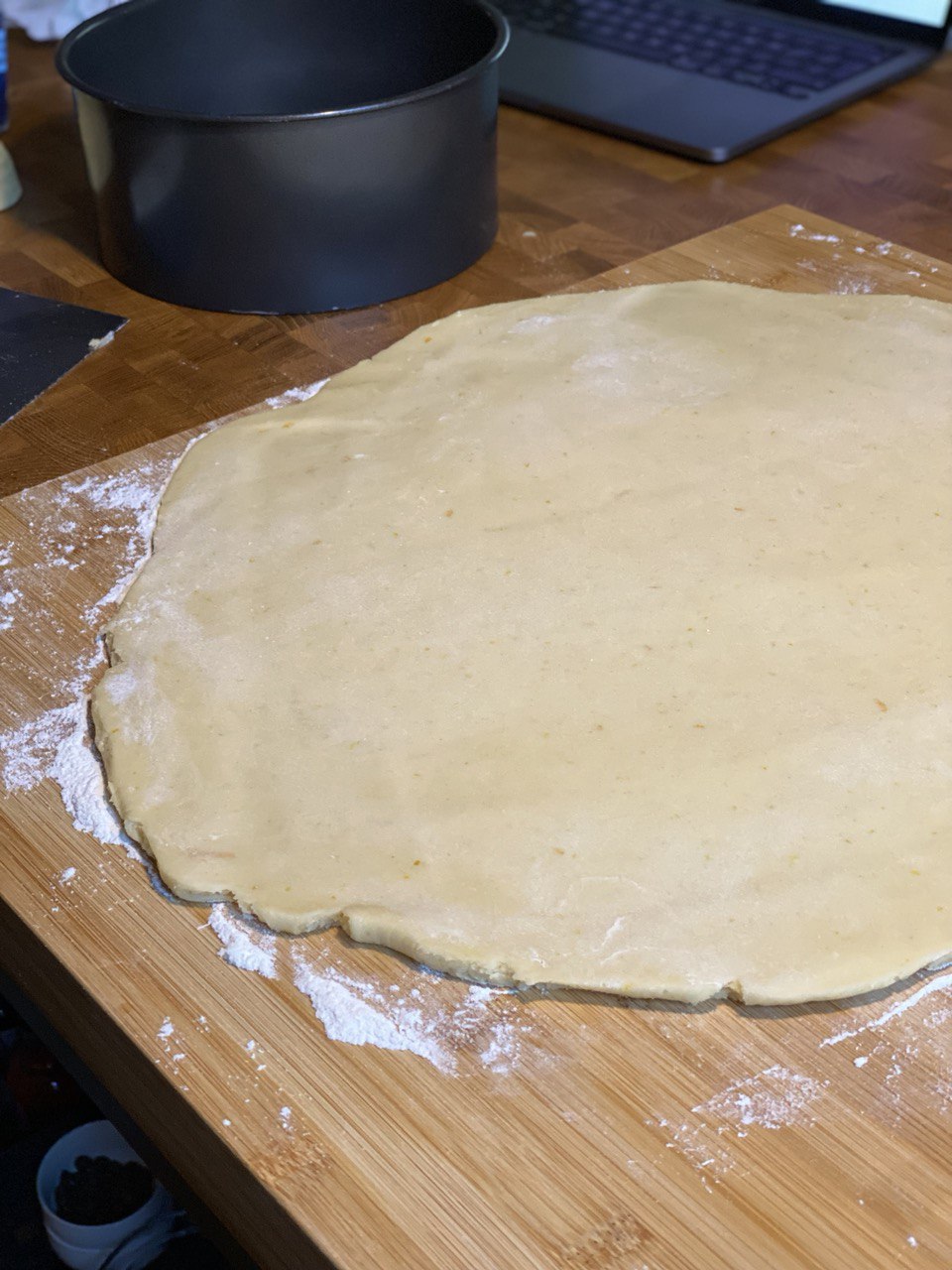
And it didn't leak indeed. At least in the oven.

Lovely and no need to wait for the next Easter.
And last but not least, we made some gnudi:
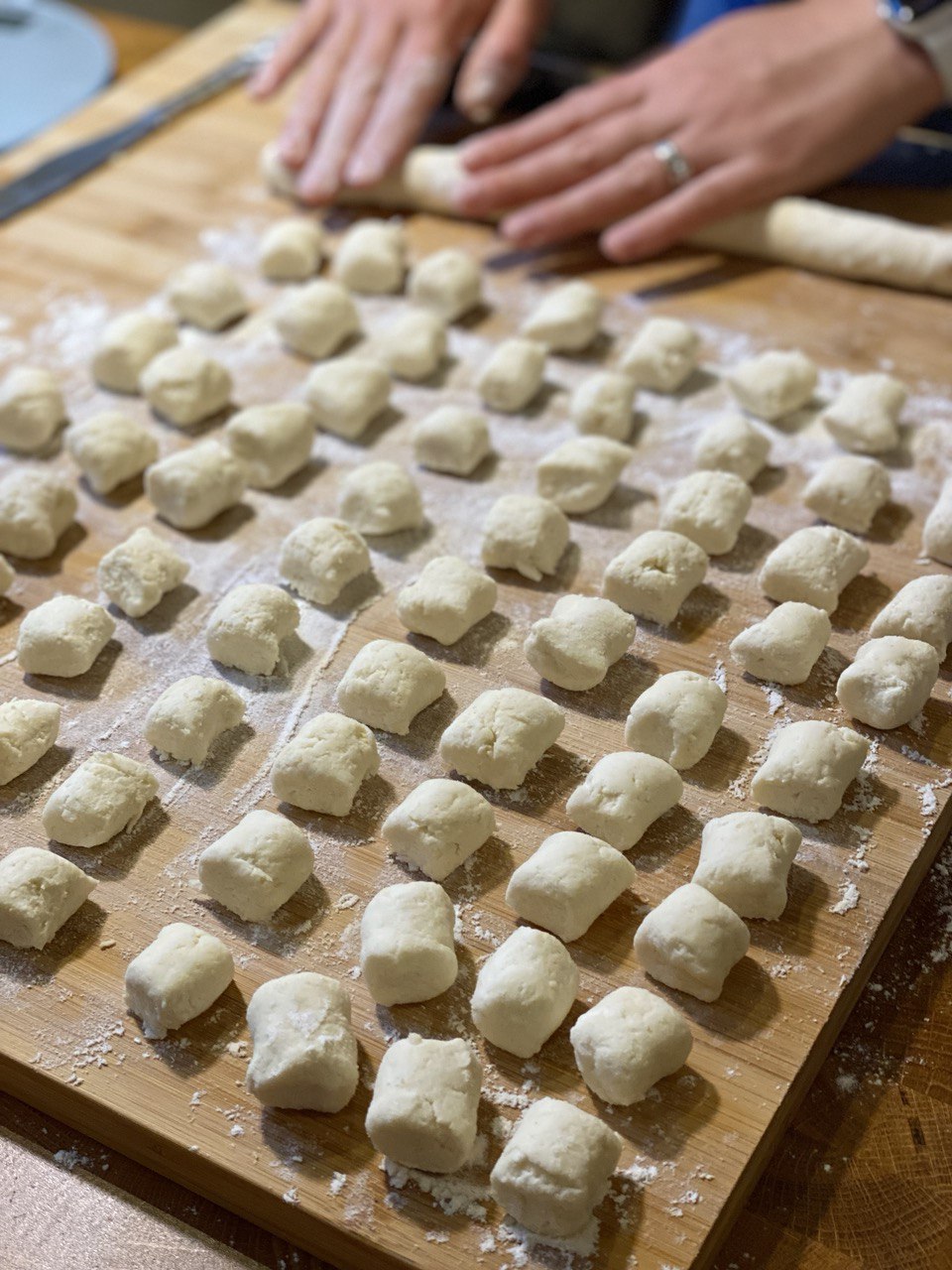
After the success of tortellini with sage brown butter, it felt like a great pairing for this dish too:
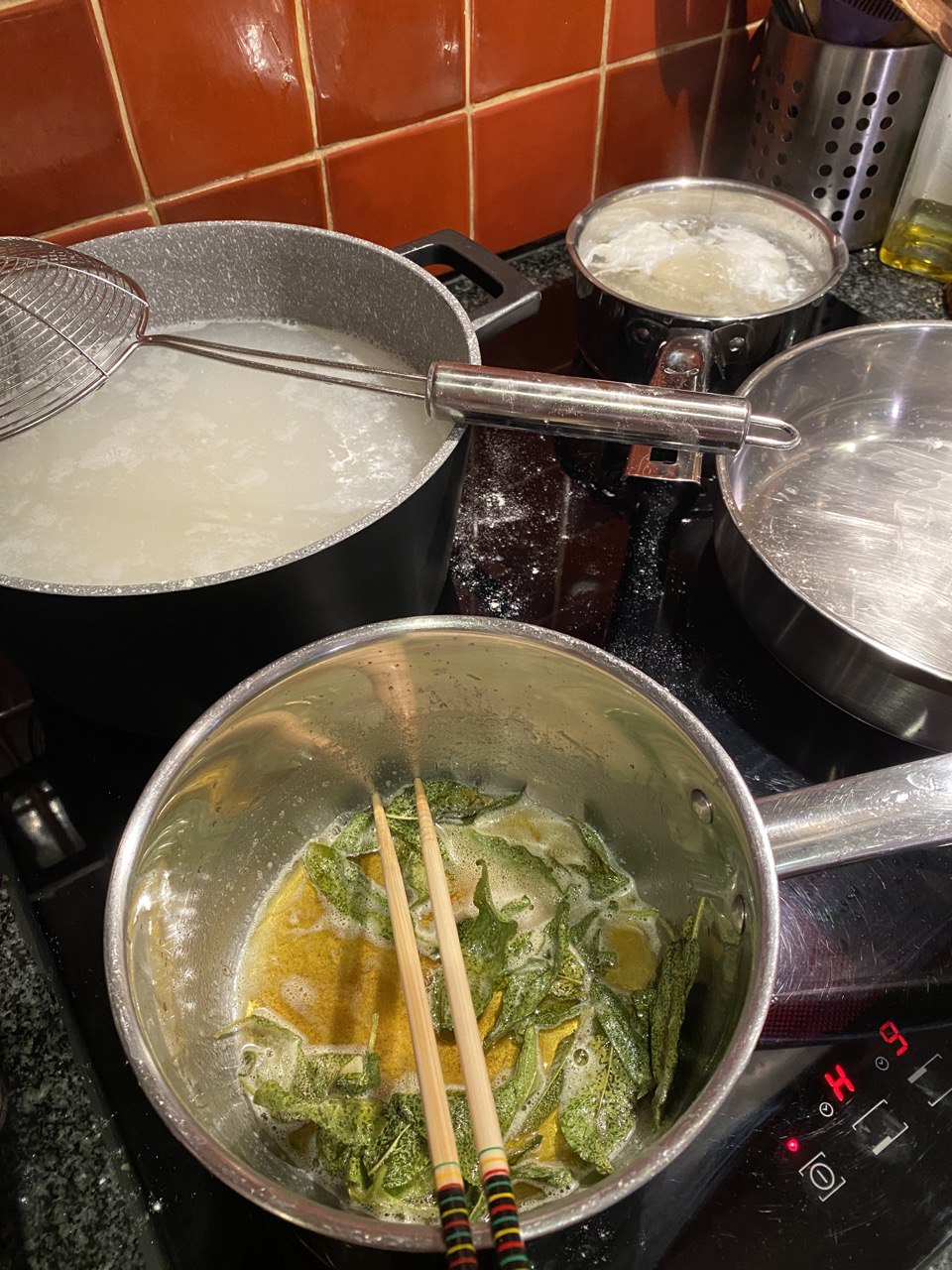
Served with a poached egg on top:
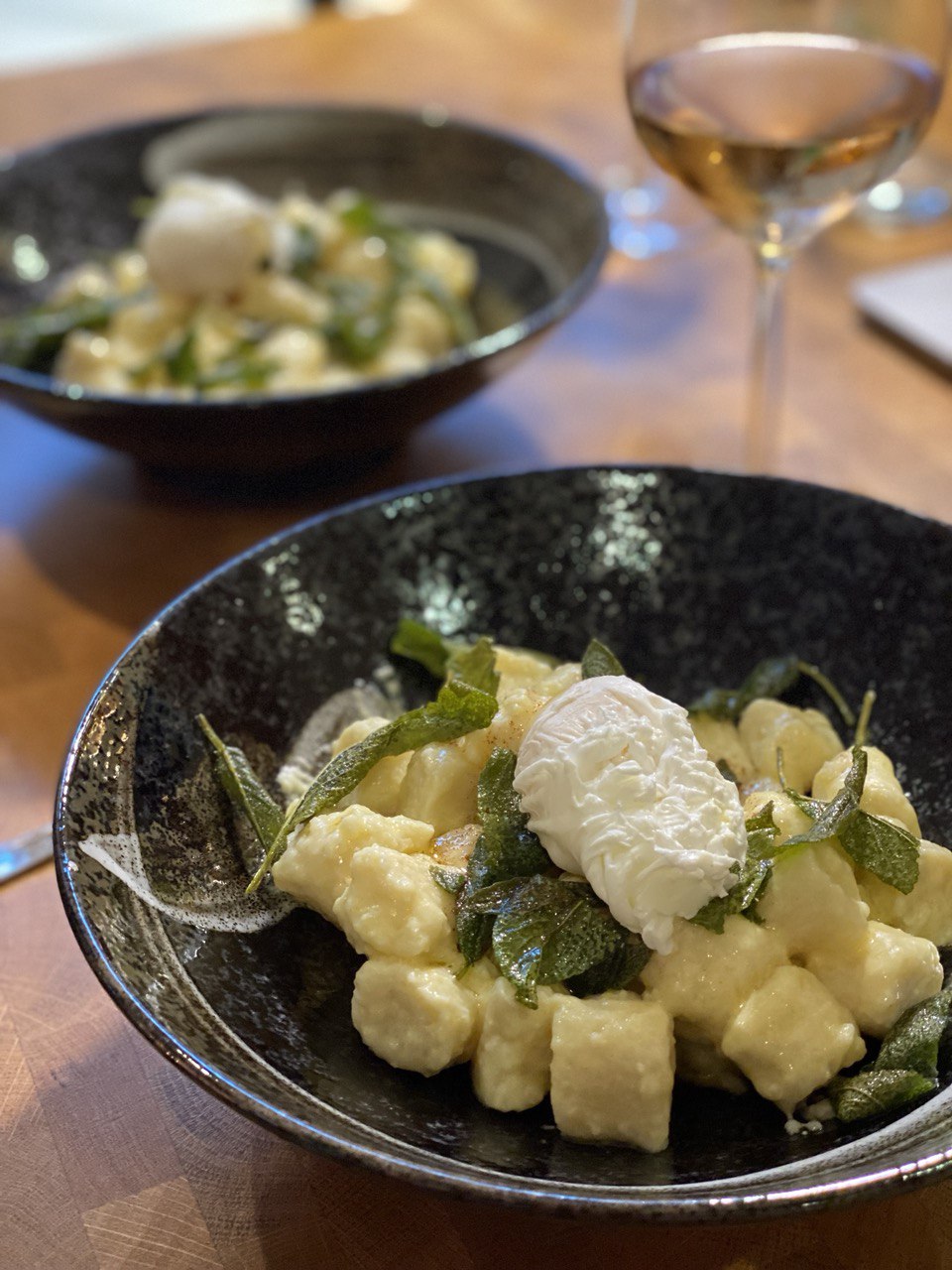
Next time I should probably focus on something with more meat though.
Things I enjoyed reading ¶
1. No More Movies by @jayriverlong ¶
This is an unusual observation about difference between books and movies.
With literature, you grow as a reader and work your way up to the greatest works, many of which are quite difficult. But movies are much more accessible and don’t require nearly as much time, so it’s easier to start with the great works. Over the years you progress to movies that are more obscure, but not necessarily better.
Personally I enjoy books for being able to let my imagination free; I love movies for exactly the opposite, and that's why I don't mind being able to tell the ending when a movies just starts. That's like binging on mac'n'cheese once in a while to better appreciate the flavours of white truffles next time.
(completely random, but truffles go really well with mac'n'cheese)
2. Stepping Back from Speaking by @martinfowler ¶
As I wrote once, my journey to speaking on stage was quite bumpy, and while I enjoy it to its fullest (and miss in-person events a lot), I see where this post is coming from:
Once I’m actually on stage, the panics usually disappear within a minute or two. Adrenaline kicks in, and that’s what propels me through the talk. (That’s a problem with online talks, I find it much harder to find that tailwind.) That adrenaline also helps me cope with people who come up after the talk to ask questions. Afterwards there is the inevitable crash, and I feel walloped for hours, tired out but unable to sleep.
In that sence, online posts capture way more attention and reaction, but probably have lower impact. It's always a choice of reaching out to many but not changing their lifes much versus talking only to a few, but affecting at least some of them. It doesn't mean one should suffer doing that, obviously.
3. Alcohol, health, and the ruthless logic of the Asian flush by @dynomight7 ¶
Despite being a dive into the way alcohol intolerance works, this post also raises some way bigger moral questions, like can we use CRISPR to alter one's body or if banning all drugs in the world (including cookies) is worth it.
First, just imagine you give alcoholics a bottle of pills, explain that they make alcohol (more) toxic, and send them on their way. Obviously, almost nobody takes them, and those that do are ultra-determined and would probably have quit anyway. You can ask patients to come into the office to take the drugs, but then people drop out. It’s just incredibly hard.
As someone whose passion is to actively watch people getting drunk from my own creations, I definitely err on the side of caution when it comes to banning anything, but the science and logic behind all these processes is indeed fascinating.
4. The Yoghurt Mafia by @EvaCorlett ¶
A hilarious story about rolling out yogurt production in a prison.
They don’t know it yet but that moment will change their lives. Not only will they go on to make yoghurt using heat from the radiator pipes running through their cells, they’ll turn yoghurt into a prison trading commodity so popular it will be smuggled between New Zealand jails. Wal and Dylan will become known as The Yoghurt Mafia, and their new obsession will give them a reason to carry on in a relentlessly bleak environment.
We've been culturing yoghurt at home for as long as we have sous vide setup, but getting to such a scale is something very different.
5. Can America save its national dish? by @asymmetricinfo ¶
I was always sure that sour cherries are very common everywhere in the world, until I came to the UK and found out that they exist only in Eastern European shops in some partly frozen, partly crushed form.
Good to know that at least in the States there are proper cherries too. Quite surprising, that a cherry pie is one of its cooking staples.
So this isn’t just an essay about pie. It is a polemic. I want to convince you that American pie is special, because it is. American pie is great, in part, because of its rich, unlikely history. But American pie is also in dire straits, because American cooks have mostly forgotten how to make the most important part.
Which means that we are at risk of losing not just a dessert, but a little piece of who we are as a country.
Also quite funny to see how many completely different recipes for a "classic American cherry pie" are out there. Reminds me of pelmeni recipes in Russia.
6. How To Get Better at Painting – Without Painting Anything by Paul ¶
The title might sound misleading unless you bear in mind that painting and drawing are different things.
The Dow book exemplifies the concept of drill. Each exercise isolates a specific area of composition and places emphasis on practising repeatedly to develop skill at it. The exercises are simplified. For months on end, I did nothing but simple line drawings of plants, and then took crops of those drawings and repeatedly refined them by tracing. I’ve done literally hundreds of these simple little drawings. I credit this practice with developing my sensitivity to spacing and proportion.
I wonder if the "drill" approach could be applied to other spheres in life. Those infamous programming contests that folks have to learn how to solve to land a job in FAANG are pretty much the same: they train you to spot and solve very specific issues almost without thinking, but then ultimately make you a slightly better engineer once you can apply them in real life too.
7. Eraser men by Jean-Baptiste Mouttet ¶
There is a dedicated group of people who travel ahead of Tour de France and remove or cover up obscene graffitis left on the road.
Indeed they are; as the van begins its descent, the penis in all its myriad forms springs up as far as the eye can see. Every hundred metres or so, sometimes flying in formation, there are male genitalia; phalluses, cocks, willies, schlongs. For each one, the Eraser Men hop out in the middle of the road and grab their paint pots. Best case scenario: genitalia are artfully transformed into a butterfly or a bear. If time is pressing, several random brush strokes are enough to at least render it unrecognisably penile.
Imagine how hard it must be to turn on TV after a long day and spot someone who managed to leave a graffiti you didn't notice.
8. JaNee: Where Is She Now? by @aarongoldfarb ¶
Do you know who is the most famous bartender in the world?
If you've seen this video, you know the answer: this lady who just poured almost a pint of whiskey in an Old Fashioned.
I've been turning this video on for almost half a decade now, whenever I was in a need for a good laugh, but never though about the story behind it. Apparently there is one:
She was forced to ad-lib her way through every drink—each of which was recorded in a single take. “It was ‘And go! And go!’” remembers Nyberg. Since there was no muddler on hand, she asked if the team had anything that could stand in—they found the comically large wooden spoon in the employee break room. She was given a single bucket of ice for the entirety of the shoot, requiring her to reuse it and strain the melted water out between each new video. Some of the drinks they asked her to prepare she had never heard of: a French Whore, a Harrison Ford, a Purple Pirate, the last one inexplicably made by mixing spiced rum and Welch’s grape juice.
Next time you want to cook something off Youtube, bear in mind that the conditions it was filmed it might be somehow similar to these ones.
9. Kaspersky Password Manager: All your passwords are belong to us by Jean-Baptiste Bédrune ¶
I had Kaspersky antivirus in my childhood and it was not the most pleasant experience (namely because of the need to have one in the first place). Seems like these days it also generates passwords, but does it so poorely they could be bruteforced in seconds:
The problem with this generator is that it is not a CSPRNG. Knowing a few of its ouputs (624 in that case) allows to retrieve its full state, and to predict all the values it will generate, plus all the values it has already generated (see Berlekamp-Massey or Reeds-Sloane algorithms).
What I love about this is the fact that anyone curious enough could find this out on their own – but most likely didn't, because there are not so many truly curious people as we tend to think.
10. What did ancient languages sound like? by Nicholas Swift ¶
So here is another example of curiousity. Those learning Latin or Ancient Greek remeber how questionable pronounciations are all the time. With Latin we have some leftovers in church-related texts, but they're so twisted no one actually relies on them anymore and sticks to vocabularies.
When students today want to know whether a particular vowel is long or short, they can consult their dictionary. But how did those lexicographers know in the first place? Take the word ἴξαλος, which is found only once in Greek literature – in Homer’s Iliad at 4.105, where it describes a wild goat. We’re not completely sure what the word means – some have suggested “full-grown” and others “leaping” – but we can tell from the meter that the alpha is short.
So relying on poetry or other literature also gives us an insight into pronounciation, and that is such a cool idea!
Things I didn't know last Tuesday ¶
1. Burning of Library of Alexandria ¶
I grew up thinking that the Alexandria's library was burnt down, and this was a tragedy. Our school history lessons portrayed it as one of the most destructive events of the past. However it in fact never happened, and most texts were copied before it slowly seized to exist.
Scholars have interpreted Cassius Dio's wording to indicate that the fire did not actually destroy the entire Library itself, but rather only a warehouse located near the docks being used by the Library to house scrolls.
This is also due to the fact that they were taking books from travellers and traders, and then giving them copies back, so its biggest value was in being a single source of truth. But nothing was destroyed forever.
2. Tarantula Hawk ¶
Thanks Internet, now I have a new fear.
One researcher described the tarantula hawk’s sting this way: "To me, the pain is like an electric wand that hits you, inducing an immediate, excruciating pain that simply shuts down one’s ability to do anything, except, perhaps, scream. Mental discipline simply does not work in these situations. The pain for me lasted only about three minutes, during which time the sting area was insensitive to touch, i.e., a pencil point poked near the sting resulted only in a dull deep pressure pain."

The only reassuring bit is that they seem to be calm enough not to attack without a reason.
3. Bubble and squeak ¶
A fresh addition to classic recipes of the island I occupy.
Bubble and squeak is a British dish made from cooked potatoes and cabbage, mixed together and fried. The food writer Howard Hillman classes it as one of the "great peasant dishes of the world".
I'd probably stick to the English breakfast though.
4. Langar ¶
I've seen those in London occasionally but always thought this is just people queueing to some charity.
In Sikhism, a langar is the community kitchen of a gurdwara, which serves meals to all free of charge, regardless of religion, caste, gender, economic status, or ethnicity. People sit on the floor and eat together, and the kitchen is maintained and serviced by Sikh community volunteers.
It probably still is a charity, but the idea behind it is way deeper.

5. The Kern baby ¶
A creepy custom I learn about from a horror movie:
This festival was all about celebrating that fact that the farmers had harvested the corn and this would mean that the community had enough to eat for another year. The last corn that was gathered would be made into a human shape, dressed in fine clothes and crowned with flowers and called the ‘Kern Baby’ or ‘Harvest Queen.’

Not sure how they even came up with that idea.
6. Quentin Zastoupil ¶
Apparently Quentin Tarantino's surname is from his biological father, who didn't live with Quentin at all, and tried to reach out only once when the latter became famous. And Quentin took this surname only at the age of 18 because it was Italian and sounded cool. Until then he had a Czech surname of his step-father.
Tarantino's mother married musician Curtis Zastoupil soon after arriving in Los Angeles, and the family moved to Torrance, a city in Los Angeles County's South Bay area. Zastoupil encouraged Tarantino's love of movies, and accompanied him to numerous film screenings. Tarantino's mother allowed him to see movies with adult content, such as Carnal Knowledge (1971) and Deliverance (1972).
Do you know who was another not-so-successfull Hollywood actor whose son was (is) way more known but didn't want to have with them anything in common? Sal Pacino, the father of Al Pacino.
7. Jun ¶
I always thought that honey is killing off bacteria, so kombucha doesn't really grow well if one replaces sugar with it.
Jun, or Xun, is a fermented drink similar to kombucha, differing only in that its base ingredients are green tea and honey instead of black tea and cane sugar.
Seems like I need to try this out instead. Maybe green tea changes something significantly?
8. Statue of the Virgin Mary in Riga ¶
Here is a story.
A statue of the Virgin Mary at the Cathedral in Riga, Latvia, was accused of being a witch. How do you check if someone is a witch? Obviously you throw it into water and see if it floats.
The statue floated since it was wooden, so Latvian folks declared it guilty in witchcraft and burnt.
In 1524, a venerated statue of the Virgin Mary in the Cathedral was denounced as a witch, and given a trial by water in the Daugava or Dvina River. The statue floated, so it was denounced as a witch and burnt at Kubsberg.
Such a brave spirits.
9. Bombay Time ¶
Here is an interesting story about different time zones before the concept was even introduced:
Until the mid-19th century local timekeeping was tied to the rising and setting of the sun. Until the early 1880s Bombay mostly followed this local solar time, or, appropriately, “Bombay Time.” But with the onset of the railways and telegraph from around the 1850s, it became expedient, even imperative, for colonial India to have a single uniform time. “Madras Time” was chosen as the default.
Check out the whole article, it's quite entertaining in many ways.
10. Cotter ¶
A nice linquistic learning for me: the word "cottage" comes from "cotters" (or farmers).
Cotters occupied cottages and cultivated small land lots. The word cotter is often employed to translate the cotarius recorded in the Domesday Book, a social class whose exact status has been the subject of some discussion among historians, and is still a matter of doubt.
Explains a lot about its (the word's) usage, especially in English.
Book of the week ¶
I sampled some nice wines over the last few weeks, and as a result found myself reading this somewhat complete opposite to Peter Stafford-Bow's trilogy about wine, this week I've been reading Victoria James' Wine Girl, which pretty much covers the same industry over the same time, but from a different perspective (of a young girl coming to the sommelier world):
...I approached the leader from the right again, pouring a taste quickly but with a calculated precision—label facing him, two ounces, a quick dip of the neck, twist, wipe with a serviette, cradle in both hands within view. He brought his lips to the glass, stuck out his tongue a tiny bit, letting the Burgundy inch in. Moments passed; he looked up at me, scoffed, and turned back to his guests. “I think she has too much perfume in her nose, this girl . . .” His glare turned upward and at me. “The bottle is corked, take it back. Bring us another.”
HoReCa is known to be a toxic industry, and while some build up a reputation thanks to it (think Gordon Ramsay) others keep struggling. This is one of a very few books that tries to explain how it is really like behind the curtains.
Thank you and see you in a week! ¶
If you have any questions, or want to suggest a link for the next newsletter, please drop me a message on Twitter or reply to this email.
Cheers! 🍸